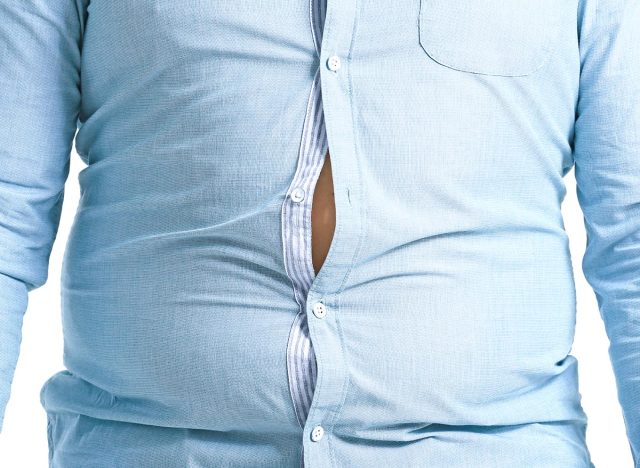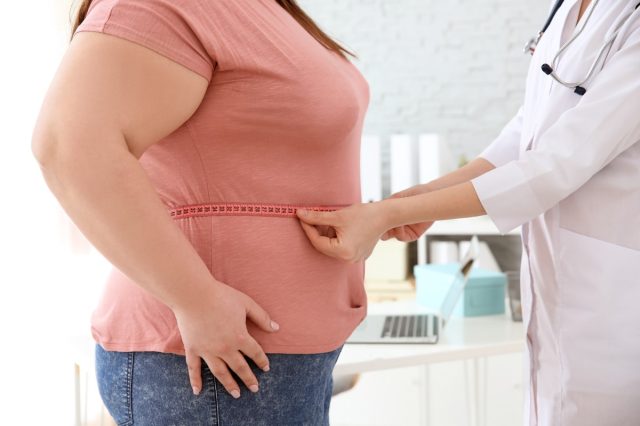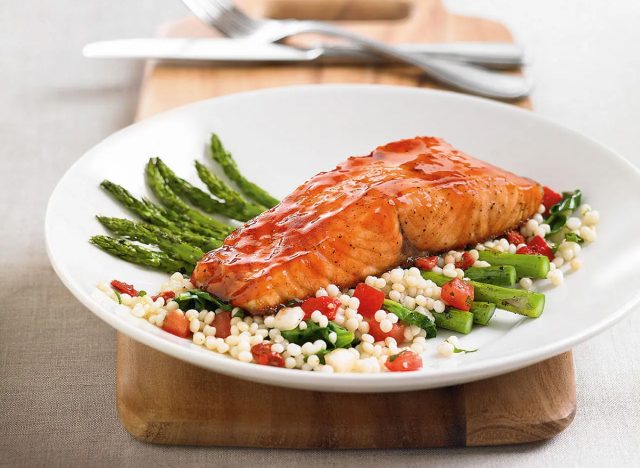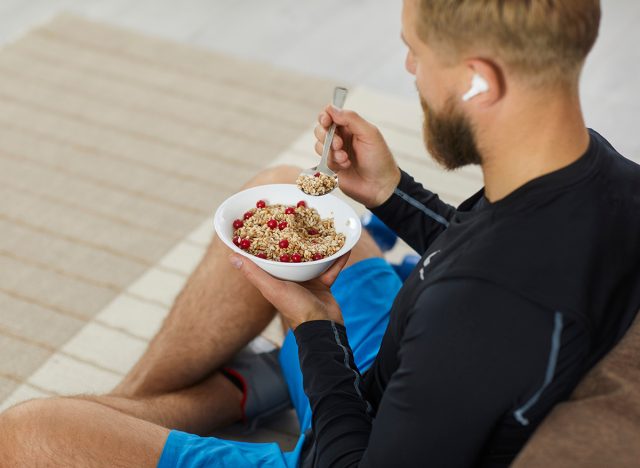Here’s What Happens to Belly Fat When You Eat 100g Protein Daily After 50

As we get older, our metabolism slows down, making it easier to put on weight and while a few pounds isn’t typically worrisome, a growing midsection is more unhealthy than you may realize. We all know too much fat is harmful, but extra pounds around your waistline is especially damaging healthwise because it indicates you have visceral fat. Unlike subcutaneous fat, which you can feel and touch, you can’t see visceral fat. It’s hidden deep in your abdomen and it wraps around your vital organs, leading to serious health issues like heart disease, certain cancers, type 2 diabetes and more.
Anyone can have visceral fat and one way to combat it is with protein. Getting enough protein in your diet can make a big difference, especially as we age, and Dr. Frank Dumont, MD, FACP, and Senior Medical Director at Virta Health explains everything to know about visceral fat and how boosting your protein intake can help fight belly fat after 50.
Why Protein is Vital After 50

Protein is important at any stage in life, but it’s something often overlooked as we age.
“Throughout life, amino acids (the “building blocks” of proteins) are necessary for the production of molecules including enzymes throughout our bodies, and the same amino acids are necessary for tissue maintenance, repair, and building,” Dr. Dumont explains.
“As we age, and as organ function declines, it is even more important that our bodies have what they need to make what they need to produce their specific sets of molecules and enzymes. In addition, after the age of 35, we generally begin to lose muscle mass, and this accelerates after the age of 50.”
He adds, “This can decrease our functionality and quality of life, can predispose us to injury, and can worsen our overall metabolic health (which can predispose us to conditions such as diabetes, heart disease and even Alzheimer’s Disease). In addition to exercise and resistance training, adequate protein intake is necessary for muscle mass preservation.”
Visceral Fat is Dangerous

While visceral fat isn’t talked about enough, it’s something to be mindful of because it’s been linked to major health conditions.
According to Dr. Dumont, “Increased visceral fat (the fat in and around our organs) is an indication of metabolic dysfunction and insulin resistance. This means that people with more visceral fat are more likely to suffer from metabolic diseases such as diabetes, heart attack, stroke, and Alzheimer’s disease.”
He explains, “However, visceral fat is not just an indicator of metabolic problems; it causes them as well. Visceral fat increases insulin resistance which can potentiate even more weight gain as well as diabetes. In addition, it increases inflammation, and this can affect the risk for multiple conditions including cardiovascular disease, dementia, and even cancer.”
How Visceral Fat Happens

Nobody can hide from visceral fat–it can happen to anyone and Dr. Dumont explains why.
“When a person starts to develop insulin resistance and metabolic dysfunction, the pancreas releases even more insulin in order to help keep blood sugar levels normal. These higher insulin levels predispose individuals to weight gain, and the weight gain which occurs with high insulin tends to be more in and around the organs rather than in safer subcutaneous fat stores. T
He adds, “The worse an individual’s level of insulin resistance is, the higher the insulin levels are likely to be, the more metabolically sick they are likely to be, and the more they are likely to store excess energy in the more dangerous visceral fat.”
How 100 Grams of Protein Plays a Factor in Belly Fat Over 50

According to Stanford Lifestyle Medicine, adults aged 50 and over should consume 1.2 – 1.6 grams of protein/kg of body weight per day (0.54 – 0.72 grams/pound body weight per day).
So for an adult weighing 165, 90-120 grams of protein is recommended. With that in mind, it’s always advisable to speak to your physician before starting a new diet regime.
“When a person focuses on adequate protein intake, the energy from protein sources tends to replace less healthy forms of calories from ultra processed foods which tend to be higher in sugars and simple carbohydrates,” Dr. Dumont says.
He explains, “Since sugars and simple carbohydrates tend to push the pancreas to release even more insulin which, in turn, causes more fat to be stored in and around the organs, eating more protein and less processed foods and carbohydrates tends to encourage the body to burn fat for energy rather than storing it.”
He adds, “This means that it isn’t just a matter of eating less and exercising more to lose weight and visceral fat. You need to eat in a way which lowers insulin and decreases fat storage, and this can make a big difference in how much visceral fat you have and what your metabolic risk is.”
How to Include More Protein in Your Diet

It can be challenging to boost your protein intake, especially, but Dr. Dumont shares ways to incorporate it into your daily diet.
“One of the best ways to increase protein in the diet is to eat real foods,” he says. “The more processed a food is, the more likely it is to be very high in sugars and simple carbohydrates (and often in combination with highly processed fats which are then more likely to be stored as visceral fat).”
Dr. Dumont explains, “If you focus on foods which are in a more natural state–foods which your grandparents would have recognized–they are likely to be higher in protein and natural fats and complex carbohydrates, all of which can be supportive of metabolic health, losing weight and visceral fat, and giving the body the right building blocks to make enzymes, to repair tissues, and to preserve muscle.”